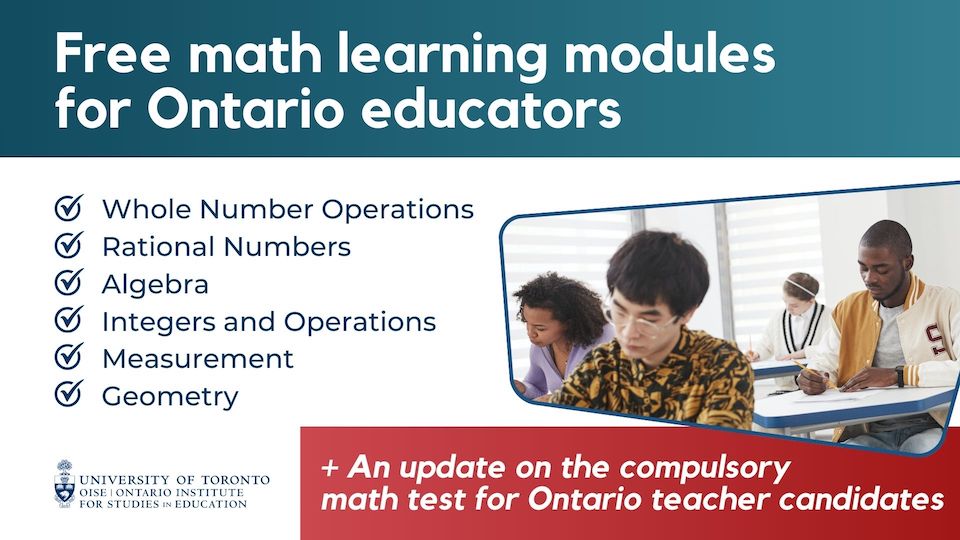

In November 2023, Ontario’s top court upheld the validity of the mandatory Mathematics Proficiency Test (MPT) for new teachers entering the field. The MPT was first introduced in 2021 as a certification requirement for teachers in response to declining math scores on standardized math tests administered to Grade 3 and 6 students. It was cancelled later that year when an Ontario court ruled the test unconstitutional. With this recent ruling, however, it seems likely the MPT will be reintroduced for future teacher candidates.
In response to the initial testing requirement, the Master of Arts Child Study and Education (MA CSE) program at the Ontario Institute for Studies in Education held group tutoring sessions for teacher candidates who expressed a lack of confidence in their math skills. During these sessions, teacher candidates prepared for the MPT by working on problem sets with assistance from students in the University of Toronto’s Mathematics Department. The sessions were designed to supplement existing mathematics pedagogy courses for prospective teachers who sought additional reinforcement of basic mathematics skills and knowledge.
When the MPT was determined to no longer be a requirement, focus shifted to developing self-directed learning modules for elementary teachers. It was evident there was an overwhelming range of online learning resources for elementary mathematics, however, most were developed for young students learning the concepts for the first time. The team worked to differentiate their modules from preexisting resources and make them more relevant for teacher candidates. This approach involved determining the fundamental concepts that teachers need to know for teaching mathematics at an elementary school level, as well as determining the most efficient means of delivering the content.
Self-directed modules intended to support primary- and junior-grade teachers. Concepts and procedures are based on Ontario’s elementary math curriculum. Each module concludes with an interactive problem-solving slide deck.
Although many questions remain surrounding the efficacy of a standardized math test for new teachers as a tool for improving math education in the province, teacher candidates should be equipped with the resources needed to refresh their math skills. The modules developed by the MA CSE program can be used to prepare for the MPT while also helping teacher candidates develop confidence in their mathematical capabilities. The material from the major strands of the Ontario mathematics curriculum was condensed into eight self-directed learning modules. The fundamental concepts and skills covered within the modules align with the expectations of the MPT and the K-8 mathematics curriculum. The learning modules include explanations on why certain algorithms work so that teacher candidates feel prepared to teach the procedures to children. Each module concludes with an interactive problem-solving slide deck that provides teacher candidates an opportunity to apply and practice concepts in different contexts.
Ontario’s Mathematics Proficiency Test: A Brief History
The MPT was first introduced in 2021 as a certification requirement for teachers in response to declining standardized math tests math scores for Grade 3 and 6 students. It was cancelled later in the year when it was ruled unconstitutional, finding it had a disproportionate adverse impact on racialized teacher candidates. According to the ruling, this violated the equality provisions outlined in section 15 of the Canadian Charter of Rights and Freedoms.
The Ontario government appealed the court’s decision, arguing it was based on preliminary and incomplete data. The Appeal Court determined that test rates of teacher candidates up to the end of 2021 showed 95 percent of those who had written the test one or more times were successful, including 93 percent of teacher candidates from racialized groups.
“Teacher candidates who do not succeed on their first attempt but are successful on a subsequent attempt are not barred from entry to the profession,” the court wrote. “Thus, with respect, there is an unsupported leap in logic from the observation that there are disparities in success rates on first attempts at the MPT to the conclusion that this demonstrates an adverse impact on entry to the teaching profession.”
As a result of this ruling, it seems likely the MPT will be reintroduced for future teacher candidates. The Ontario College of Teachers is currently reviewing the decision to determine the next steps for reinstating the MPT as a requirement for certification.
“From an equity lens, this process of a mandatory MPT for all teachers can serve as gatekeeping mechanism/process to keep diverse identities out of an already not diverse teaching workforce. The discourse also takes the focus away from discussing how schools in under-resourced communities are often neglected when it comes to access to opportunities,” says Dr. Ardavan Eizadirad, Assistant Professor in the Faculty of Education at Wilfrid Laurier University and Executive Director of Youth Association for Academics, Athletics & Character Education (YAAACE). “I think the focus must be on resources for students, teachers, and schools in under-resourced communities—addressing the opportunity gap fuelled by systemic barriers—rather than blaming lack of knowledge by teachers.”

Bisman Kaur
Teacher Candidate, Master of Teaching program at Ontario Institute for Studies in Education

